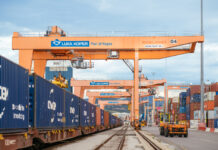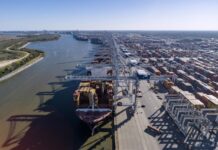
Singapore-based liner Pacific International Lines (PIL) is consolidating its intermodal offerings to drive integrator goals.
PIL Intermodal Services has now extended its presence to Indonesia, Myanmar and Pakistan. The logistics arm provides truck, train and barge solutions to complement the carrier’s port-to-port shipping networks.
The predominant Asian liner already has an intermodal footprint in all other major markets in the region, including India.
“The expansion of PIL Intermodal Services is testament to PIL’s commitment of ‘driving connectivity’ for our customers,” the carrier said in a statement.
PIL further noted, “By enhancing our point-to-point connectivity, customers can save more time and resources when delivering their cargoes through our one-stop end-to-end transportation solution.”
The carrier went on to add, “With more options to deliver their cargoes efficiently and flexibly, customers are also empowered to reduce the carbon footprint of their overall supply chains.”
According to the statement, PIL has also augmented its intermodal service offerings in Africa, China, Guatemala, India, Mexico, New Zealand, South Korea, Thailand and Vietnam by including new destinations within these regions.
The buzz around an integrator model of operations in the container shipping industry arguably stemmed from a plan rolled out by Maersk in 2017 to transform itself from a niche shipping line to an end-to-end logistics provider.
Other major container carriers were quick to jump on the integrator bandwagon to keep pace with evolving trade dynamics.
In pursuit of such goals, Maersk has opened a clutch of new freight stations/inland depots in India over the past year.
Other major container carriers have also shown greater investment interest in India’s warehousing and landside infrastructure verticals to capitalise on high economic growth indicators for the emerging economy.
For example, Hapag-Lloyd recently bought a 40% stake in Mumbai-based J.M. Baxi Group’s terminal arm, which holds concession rights at several ports in the country, including Nhava Sheva (JNPT).
Additionally, CEVA Logistics, a CMA CGM subsidiary, has inked a strategic deal to acquire Mumbai-based Stellar Value Chain Solutions, a contract logistics company.
Jenny Daniel
Global Correspondent
Contact email: j.daniel@container-news.com




